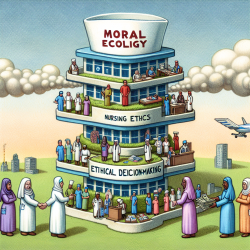Introduction to Moral Ecology in Nursing
In the dynamic world of nursing, ethical dilemmas are a daily occurrence. Nurses, as moral agents, must navigate these challenges with sensitivity and sound judgment. The concept of moral ecology, as presented in the research article "Moral Ecology in Nursing: A Pluralistic Approach," offers a fresh perspective on ethical decision-making in nursing. By understanding and applying the principles of moral ecology, nurses can enhance their ethical awareness and decision-making skills, ultimately improving patient care.
Understanding Moral Ecology
Moral ecology is a framework that recognizes the complex interplay of multiple ethical systems influencing nurses' actions. It acknowledges that nurses operate within various ethical environments, including personal beliefs, organizational directives, professional codes, and broader societal norms. This ecological model allows nurses to draw from a diverse array of ethical frameworks, enabling them to make well-rounded and contextually appropriate decisions.
The Pluralistic Approach
The pluralistic approach to ethics, as advocated in the article, encourages nurses to embrace multiple ethical frameworks rather than relying on a single, rigid system. This flexibility is crucial in the diverse and ever-changing landscape of healthcare. By adopting a pluralistic mindset, nurses can tailor their ethical decision-making to the specific context of each situation, ensuring that their actions align with both personal and professional values.
Key Components of Moral Ecology
- Moral Sensitivity: Recognizing and interpreting ethical issues as they arise in practice.
- Moral Judgment: Making informed decisions based on ethical principles and frameworks.
- Moral Intent: Committing to act ethically, even in challenging situations.
- Moral Character: The ability to translate ethical intentions into action.
Practical Applications
Nurses can apply the principles of moral ecology in various ways to enhance their practice:
- Education: Incorporate moral ecology into nursing education to prepare students for real-world ethical challenges.
- Reflection: Encourage self-reflection and discussion among nursing teams to explore ethical dilemmas and potential solutions.
- Policy Development: Use moral ecology as a framework for developing ethical policies and guidelines within healthcare organizations.
Encouraging Further Research
The article "Moral Ecology in Nursing: A Pluralistic Approach" provides a solid foundation for understanding the complexities of ethical decision-making in nursing. However, there is always room for further exploration and research. Nurses are encouraged to delve deeper into the topic, examining how moral ecology can be applied in different settings and cultures. By expanding their knowledge, nurses can continue to evolve as ethical practitioners, providing the highest standard of care to their patients.
To read the original research paper, please follow this link: Moral Ecology in Nursing: A Pluralistic Approach.










